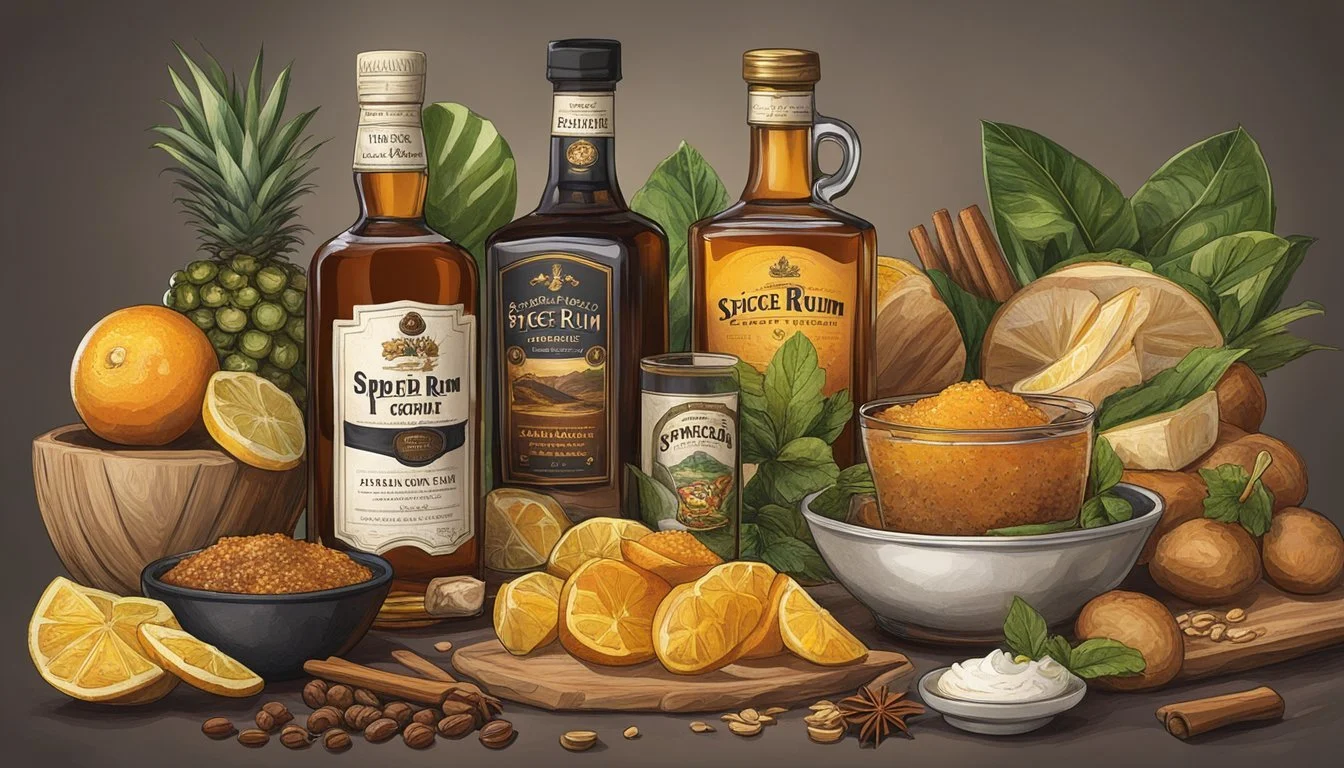How to Substitute Spiced Rum for Dark Rum
A Simple Swap Guide
Substituting spiced rum for dark rum in recipes is a viable option for both cooking and cocktail making, with the understanding that the flavor profile of the dish or drink will be altered. Spiced rum, which is typically infused with a range of spices like cinnamon, nutmeg, and vanilla, introduces a more complex and aromatic character compared to the smoother, often more robust flavor of dark rum. While dark rum contributes a rich and molasses-heavy taste due to its aging process, the spiciness of spiced rum can add an unexpected twist to a recipe.
When considering the substitution, it’s essential to be mindful of the balance of flavors. While dark rum might be a key ingredient in providing depth in a recipe, spiced rum brings its own unique blend of flavors that can complement the existing ingredients. For example, in baking or dessert applications where spices are already a component of the recipe, spiced rum can enhance and echo these flavors. In cocktail crafting, the substitution can transform a drink, making it more intricate and spice-forward, which might be desirable in some mixes.
For those looking to substitute dark rum with spiced rum, it’s recommended to start with a small amount and adjust to taste, since the spices can easily become the dominant note. Careful consideration should be given to the other ingredients within the recipe, ensuring they can harmonize with the additional spices that spiced rum introduces. By doing so, one can successfully adapt their recipes without compromising the integrity of the original dish or beverage.
Understanding Rum
Rum's diversity in types and flavors is rooted in its rich history and complex production process. The type of rum influences its flavor profile, aging process, and ultimately, its suitability for substitution in various recipes.
History of Rum
Rum originated in the Caribbean in the 17th century as a byproduct of sugarcane refining. The discovery that molasses, a sugarcane residue, could be fermented and distilled paved the way for rum production. It rapidly became a staple of the maritime and colonial economies.
Types of Rum
There are several types of rum, classified primarily by color and flavor:
Light Rums: Also called silver or white rums, these are generally subtle in flavor, lighter in color, and are often used in cocktails.
Gold Rums: These have a medium body and are often aged in wooden barrels to acquire their golden color.
Dark Rums: Known for their full-bodied taste and rich, caramelized color, derived from extended aging in oak barrels.
Spiced Rums: A variant of rum infused with spices, fruits, or other flavoring agents, which can vary from cinnamon to vanilla, creating a distinct flavor profile.
Overproof Rums: These have a higher alcohol content than standard rums, often above 57.5% alcohol by volume.
Rum Production Process
The process of making rum begins with sugarcane, which is harvested and processed to extract its juice or made into molasses. Yeast is added to the sugarcane byproduct to initiate fermentation.
Fermentation: The duration and type of yeast affect the flavor; lighter rums use 'faster' yeasts.
Distillation: The alcoholic liquid from fermentation is distilled to increase its alcohol content. The type of still used also influences the rum's flavor.
Aging: Aging occurs in oak barrels, which impart color and flavor to the rum. The length of aging is crucial; darker rums typically age longer and take on a heavier, more complex flavor profile.
Blending and Bottling: Finally, rums may be blended for consistency and bottled, with some variations having additional spices or flavorings added.
Understanding the specifics of rum—their origins, types, and how they are produced—is crucial in discerning how one may be substituted for another without compromising the integrity of a recipe.
The Flavor Profiles
Understanding the distinct flavor profiles of dark rum and spiced rum is essential for successful substitution in recipes, ensuring that the essence of the dish remains intact.
Dark Rum Characteristics
Dark rum is typified by its deep, rich flavor that often includes undertones of molasses and a hint of caramel. Aged longer than light rums, dark rum provides a complexity that is attributed to the extended barrel aging process. Connoisseurs of dark rum might detect notes of:
Toasted almond
Banana
These specific flavors contribute to dark rum's robust profile, making it a staple in certain cocktails and culinary recipes.
Spiced Rum Attributes
Spiced rum, as the name suggests, presents a bouquet of added spices and flavoring agents. These may include, but are not limited to:
The additional ingredients impart a vibrant and often warming character to spiced rum. It's important to note that the spice blend is unique to each brand, which affects the rum's specific flavor nuances. Vanilla is a common additive that complements the inherent sweetness of the rum base.
When substituting spiced rum for dark rum, it's necessary to consider the impact of these additional flavors on the desired taste of the final product.
Cocktails and Mixology
Substituting spiced rum for dark rum in cocktails requires understanding how the flavors interact with other ingredients. The spices in the spiced rum will alter the taste profile of any cocktail it's used in.
Classic Rum Cocktails
Classic rum cocktails typically rely on the deep and rich flavor of dark rum. For instance:
Mojito: It traditionally includes white rum, but using dark rum adds a caramel depth. With spiced rum, one would encounter a more complex, aromatic twist.
Daiquiri: A cocktail known for its simplicity, combining rum, citrus juice, and sugar. Substituting with spiced rum introduces a warm, nuanced character to the daiquiri.
Piña Colada: The creamy fusion with pineapple and coconut is balanced by the richness of dark rum. Spiced rum can add a dimension of flavor with its notes of vanilla, cinnamon, or nutmeg.
When swapping dark rum for spiced rum in these cocktails, it's important to consider the additional flavors that spiced rum brings and how it might complement or contrast with other ingredients.
Mixing with Spiced Rum
Mixologists often appreciate spiced rum for its ability to add complexity to cocktails:
With Cola: The pairing creates a variation of the classic rum and cola, with the spices enhancing the drink's zest.
Citrus Mixes: Citrus juices cut through the sweetness of spiced rum, making for a refreshing and vibrant cocktail.
Tropical Blends: Combine spiced rum with tropical flavors like pineapple or orange juice to craft drinks with layers of flavor that are both fruity and spicy.
Always taste and adjust the mix based on the specific spices in your spiced rum and the desired outcome of your cocktail, ensuring a balanced drink where no single flavor overpowers the others.
Substituting Spiced Rum for Dark Rum
When a recipe or cocktail calls for dark rum but all that's available is spiced rum, a cook or bartender needs to understand how the substitution will affect the flavor profile. Dark rum, typically richer and sometimes sweeter due to longer aging and caramelized sugar content, varies from spiced rum, which contains additional spices.
Direct Substitution
For most recipes, one can directly substitute spiced rum for dark rum in equal proportions. While dark rum is distilled from sugar cane and offers a smooth, sweet, and slightly toasty flavor, spiced rum includes various spices such as cinnamon, vanilla, and nutmeg, creating a more complex flavor. The additional spices may enhance certain recipes that complement these flavors.
Adjusting for Sweetness
Spiced rum generally contains added sweeteners and flavors not present in dark rum. If a recipe requires dark rum, which has the natural sweetness from molasses, and the chef is using spiced rum, they might need to reduce other sweetening agents in the dish to balance the overall sweetness. For example:
Original recipe calls for:
1 cup of dark rum
1/2 cup of sugar
Adapted recipe with spiced rum might call for:
1 cup of spiced rum
1/3 cup of sugar
Adjustments should be made based on tasting and personal preference.
Considering Cocktail Profiles
When substituting in cocktails, understanding the flavor profile is crucial. Dark rum contributes a warm, molasses-like sweetness, while spiced rum imparts its distinctive spiced characteristics. For classic rum cocktails like a Dark 'n' Stormy or a Mojito that rely on the flavor of the rum to shine through, a substitution might noticeably change the profile. If the drink benefits from added spices, such as those found in a spiced rum, the substitution can create an interesting and enjoyable variation. A bartender might use bold flavors like spiced rum in cocktails where the typically heavier and sweeter dark rum would dominate.
Non-Alcoholic Alternatives
When seeking to replace dark rum in recipes without the alcohol content, non-alcoholic substitutions can mimic the complex flavors of dark rum. From zero-proof spirits to clever use of extracts, one can create the desired taste profile in both beverages and culinary applications.
Zero-Proof Substitutes
Lyre's Dark Cane Spirit: Serves as an excellent substitute with a flavor profile closely resembling dark rum. It can be used in equal measure to the rum called for in a recipe.
Ritual Non-Alcoholic Rum Alternative: Ideal for replicating the taste of dark rum in a Cuba Libre without the alcohol.
ISH Spirits Non-Alcoholic Rum: Offers a flavor that works well in mocktail versions of rum-based cocktails, such as Mojitos.
Flavoring Without Alcohol
Vanilla Extract: Provides a warm, rich flavor similar to rum. It can be used sparingly, as the flavor is concentrated.
Almond Extract: Delivers a nutty flavor that complements the sweetness found in dark rum; use in moderation due to its strong flavor.
Coffee Extract or Syrup: Imparts a deep, complex flavor for substitutions where a rich profile is desired; suitable for certain cocktails and baking recipes.
Rum Extract: A concentrated non-alcoholic liquid that mimics the flavor of rum. One tablespoon of rum extract is generally equivalent to two tablespoons of dark rum.
Cooking and Baking with Rum
When incorporating rum into cooking and baking, one must consider the distinct flavor profile it brings to both sweet and savory dishes. Understanding the role of rum in various recipes enables a seamless substitution process.
Rum in Baking
In baking, rum is often used for its warm and complex flavor, enhancing cakes, pastries, and other desserts (What wine goes well with desserts?). A notable example is the classic rum cake recipe, where dark rum typically adds a rich, aromatic depth. For a cake recipe such as tiramisu, which may call for rum to complement the coffee-soaked ladyfingers, one can substitute rum with vanilla extract when needed to maintain the dessert's luxurious taste.
Rum Type Substitution Tiramisu Example Dark Rum Vanilla Extract (or a non-alcoholic option like apple cider or prune juice) Substitute equal parts of the vanilla extract or half the quantity of potent non-alcoholic options for the rum called for in the tiramisu.
Savory Dishes with Rum Flavor
In savory cooking, rum is introduced to dishes to embolden flavors with its sweet and toasty notes. It pairs well with proteins like poultry, pork, or seafood and excels in marinades or glazes where its flavor can permeate the food. A suitable substitute for rum in savory dishes could be a combination of fruit juice, such as apple or pineapple, with a touch of vanilla to mimic the sweet and robust profile of rum.
Dish Type Rum Substitute Flavor Notes Marinades/Glazes Apple or Pineapple Juice with Vanilla A sweet, yet tangy blend with a hint of vanilla to echo rum's warmth.
In both sweet and savory dishes, the essence of rum is to provide a certain richness and nuance that can be replicated through careful selection of substitutes that honor the original flavor intentions.
Exploring Rum Alternatives
When substituting for dark rum, one may consider various alternatives that preserve the intended flavor profile of the dish or cocktail. Understanding the nuances of each substitute is crucial for a successful adaptation.
Liquor Substitutions
Several liquors can serve as an alcoholic substitute for dark rum, each bringing its unique characteristics:
Brandy: Exhibits a sweet and fruity profile.
Cognac: A type of brandy, offering a richer, more nuanced flavor.
Bourbon: Adds a smoky and slightly sweet touch.
Whiskey: Provides a complex bouquet of flavors, varying greatly among different types.
Sherry: Can contribute a nutty and sweet component.
Marsala: Introduces a touch of sweetness and depth.
Cachaça: Offers a lighter, grassy note often used in tropical drinks.
Gin: May be suitable for certain cocktails but has a distinctly botanical flavor that can change the desired taste significantly.
Remember to use these substitutes in moderation since their flavor intensities can differ from dark rum.
Fruit Juice and Extract Alternatives
For non-alcoholic options or to add a different flavor dimension, consider the following fruit juice and extract alternatives:
Pineapple Juice: Works well in tropical dishes and cocktails.
Apple Juice: Brings a subtle sweetness and fruity accent.
White Grape Juice: Adds mild fruitiness and sweetness, suitable for both savories and sweets.
Coconut Milk: Lends a creamy texture and tropical flavor, best for some beverages and desserts.
Coffee Extract or Strong Espresso: Imparts a rich and robust flavor, perfect for recipes like tiramisu or other desserts where coffee is a complementary flavor.
The ratio for substitution can vary based on the intensity and sweetness of the juice or extract; hence, it is typically recommended to begin with a small amount and adjust to taste.
Pairing Rum with Foods and Drinks
Rum's versatility allows it to pair splendidly with a variety of foods and drinks, enhancing flavors through complementary and contrasting notes. Knowing which type of rum to pair can elevate a meal or cocktail experience.
Perfect Pairings for Dark Rum
Dark rum, known for its full-bodied flavor characterized by deep caramel, molasses, and sometimes subtle smokiness, pairs exceptionally with hearty and rich foods.
Red Meat: The robust flavors of red meat, such as steak or lamb, find a counterpart in the intensity of dark rum.
Chocolate and Desserts: Desserts, particularly those with chocolate, are accentuated by dark rum's sweet and oaky undertones.
Coffee and Tea: These beverages harmonize with dark rum, as the natural bitterness balances the sweetness of the rum.
For beverages, dark rum enhances the flavors of:
Fruit Juices: Dark rum complements citrus and apple cider, adding depth to fruity drinks.
Punches: Enhance punches with a splash of dark rum for a richer taste.
Creating Harmonious Spiced Rum Combinations
Spiced rum, infused with spices like cinnamon and vanilla, pairs well with lighter, more aromatic flavors.
Seafood: A light seafood dish can be nicely complemented by the nuanced spices in spiced rum.
Amaretto: The almond flavor of amaretto and the warm spices in rum can create a delightful combination.
Citrus: Lemon juice or other citrus mixers can cut through the spiciness, creating a refreshing pairing.
In drinks:
Beer Cocktails: Combine spiced rum with beer for a complex, layered flavor.
Hot Drinks: Add spiced rum to hot apple cider or tea to create a comforting, warm concoction.
By carefully selecting the type of rum for specific food and drink pairings, one can enhance the tasting experience.
Conclusion
When considering the substitution of spiced rum for dark rum, one should be aware of the flavor changes it may introduce to the recipe or cocktail. Spiced rum typically incorporates various spices and flavoring agents like cinnamon, vanilla, or anise, which can enrich a dish or drink with a distinct and aromatic character.
In contrast, dark rum is noted for its deep, caramel-tinged flavor brought about by a longer aging process. To use spiced rum as a substitute, it is advisable to:
Start with a smaller amount and adjust to taste, as spiced rum can be more potent in flavor.
Be mindful of any additional sweetness that spiced rum might contribute to the recipe.
For baking, where the rum is often a key flavor, individuals may experiment with a combination of spiced rum and other ingredients such as apple cider vinegar or bourbon to mimic the complex profile of dark rum. It's worth noting that any substitution will inherently alter the final outcome to some extent.
To summarize:
Spiced rum can be used in place of dark rum
Adjust quantities to moderate the flavor impact
Consider supplemental ingredients for baking applications
Remember that these adjustments are subjective and should be tailored to personal taste and the specific requirements of the dish or drink being prepared.







